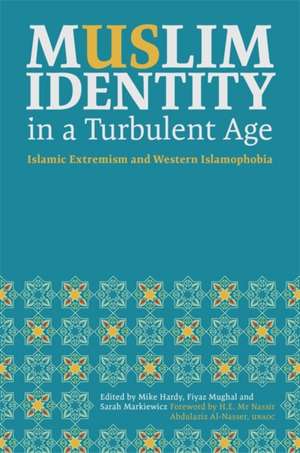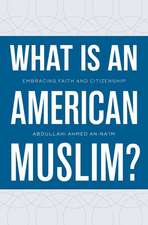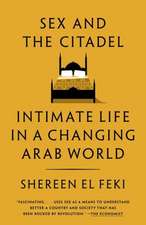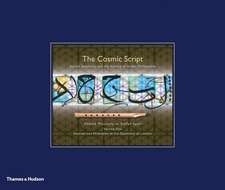Muslim Identity in a Turbulent Age
Editat de Mike Hardy, Fiyaz Mughal, Sarah Markiewiczen Limba Engleză Paperback – 19 ian 2017
With diverse contributions from Muslims, Christians and individuals with no religious affiliations, this collection of essays respond to the King of Jordan's Amman Message - an initiative seeking to clarify Islam as a religion of peace - in light of recent international events such as the Charlie Hebdo controversy. Presenting fresh perspectives on a frequently misrepresented religion, this book offers a platform for debate about Islam's place within Western culture and political systems, and the role that faith communities can play in seeking peace and reconciliation.
Preț: 185.82 lei
Nou
Puncte Express: 279
Preț estimativ în valută:
35.56€ • 37.22$ • 29.59£
35.56€ • 37.22$ • 29.59£
Carte disponibilă
Livrare economică 10-24 martie
Preluare comenzi: 021 569.72.76
Specificații
ISBN-13: 9781785921520
ISBN-10: 1785921525
Pagini: 272
Dimensiuni: 156 x 228 x 21 mm
Greutate: 0.38 kg
Editura: JESSICA KINGSLEY PUBLISHERS
ISBN-10: 1785921525
Pagini: 272
Dimensiuni: 156 x 228 x 21 mm
Greutate: 0.38 kg
Editura: JESSICA KINGSLEY PUBLISHERS
Cuprins
Acknowledgements. Foreword by HRH Charles, Prince of Wales. Foreword by HRH Prince Hussein bin Abdullah. Timeline. Introduction. 1. The History of the Amman Message and the Promotion of the Amman Message Project. Sarah Markiewicz, Research and Teaching Associate, Department of Religious Studies and Intercultural Theology, Humboldt University, Berlin, Germany. 2. Taking the Amman Message to European Audiences: A Message for Muslims and Non-Muslims Alike. Mike Hardy, CMG OBE FRSA, Founding and Executive Director, Centre for Trust Peace and Social Relations, Coventry University, UK. 3. Islam in Europe and the Amman Message: Overview Challenges and Potentials. Rebecca Catto. Assistant Professor of Sociology, Kent State University, Ohio, USA. 4. Islam in the United Kingdom and the Impact of the Amman Message. Fiyaz Mughal, OBE FCMI, Founder and Director, Faith Matters, UK. 5. Young British Muslims: Online Extremism and the Message of Islam. Imran Awan, Associate Professor in Criminology, Birmingham City University, UK. 6. The Amman Message: An Early Confrontation with Extremist Islamic Movements. Jamal Al-Shalabi. Professor of Political Science, Department of International Relations and Strategic Studies, Hashemite University of Jordan, Jordan, 7. The Amman Message: A Counter Narrative to Islamic Fundamentalism. Moh'd Khair Eiedat, Professor for Political Science, Al-Hussain Bin Abdullah II Faculty for International Studies and Political Science, and Director of the Al-Farabi Centre for Culture, Ethics and Politics, University of Jordan, Jordan. 8. The Amman Message as an Invitation to Interfaith Dialogue: A Christian Response. Christine Seeberg, Research and Teaching Associate, Department of Systematic Theology and Dogmatics, Theological Faculty, Humboldt University, Berlin, Germany. 9. Charlie Hebdo and the Amman Message: A Counter Narrative to Violent Fundamentalism? Steve Rose, Freelance Writer and Journalist, UK. & Faith Matters. 10. The Amman Message 'Other': Repositioning Identity Politics for Dialogue and Justice. Kristin Shamas, Hamra Post-Doctoral Research Fellow, Department of History, University of Oklahoma, USA. 11. Looking Forward: An Impossible Road? Mike Hardy, Fiyaz Mughal and Sarah Markiewicz. Appendix I: The Amman Message (2004). Appendix II: The Three Points of the Amman Message (2005) [Official Version]. Further Reading. The Contributors.
Descriere
Engaging with the 2004 Amman message, which sought to clarify Islam's true peaceful nature, this book debates what it means to be Muslim in Europe today. Shining a light on Islam's religious, political and cultural tenets, and its portrayal in the media, this book explores the role Islam can play in interfaith dialogues on peace and reconciliation.








